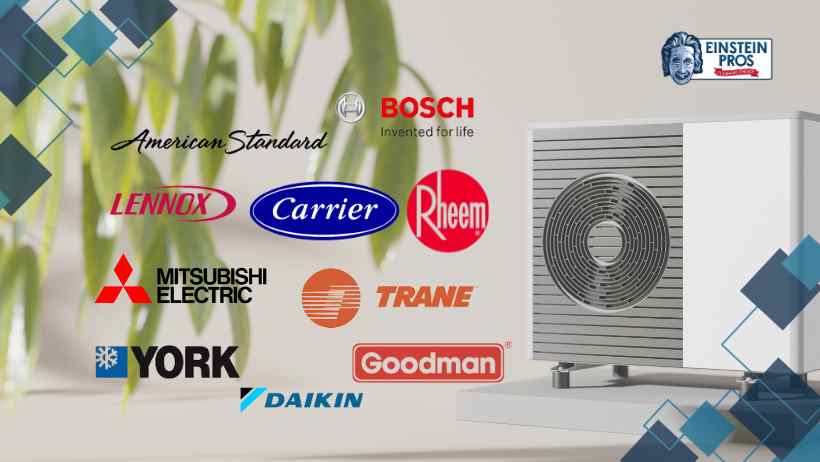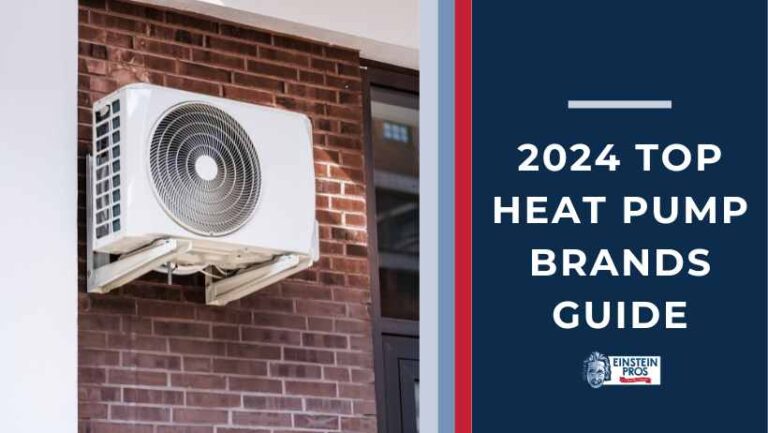Heat pumps have become indispensable for maintaining year-round comfort in homes, offering both heating and cooling capabilities. In this blog post, we’ll delve into the factors affecting which heat pump to get, different brands’ advantages, disadvantages, and average costs of the best heat pump brands available today in the Phoenix heat pump market.
Factors to Consider When Buying Heat Pumps
1. Performance and Efficiency
SEER and HSPF Ratings
- The efficiency of a heat pump is crucial for both optimal performance and cost-effectiveness. Seasonal Energy Efficiency Ratio (SEER) and Heating Seasonal Performance Factor (HSPF) are key metrics to consider. Higher SEER and HSPF ratings indicate better efficiency, translating to lower energy consumption and reduced utility bills.
Variable-Speed Technology
- Look for heat pumps with variable-speed compressors. These systems adjust their output based on the heating or cooling needs, providing precise temperature control and improving overall efficiency. Variable-speed technology ensures a consistent and comfortable indoor environment.
2. Reliability and Durability
Build Quality and Materials
- If you’re searching for “what is the most reliable heat pump brand,” make sure to invest in quality materials and construction. Components like the compressor, coil, and fan should be durable to withstand various weather conditions. Stainless steel or coated coils contribute to the longevity of the unit by preventing corrosion.
Brand Reputation and User Reviews
- Research the reputation of each heat pump brand by reading user reviews and testimonials. A brand with a positive track record for reliability and customer satisfaction is likely to offer durable and dependable products. Online forums and HVAC community discussions are valuable resources for gauging user experiences.
3. Innovative Technology
Smart Thermostat Compatibility
- Modern heat pumps often come with smart technology integration. Compatibility with smart thermostats allows for remote control and automation, enhancing convenience and energy efficiency. Check if the heat pump brand offers options that integrate seamlessly with popular smart home ecosystems.
Noise Levels
- Innovative features extend beyond functionality. Consider the noise levels produced by the heat pump during operation. Brands that invest in sound-dampening technology provide quieter heating and cooling solutions, contributing to a more peaceful indoor environment.
4. Warranty and Customer Support
Warranty Coverage
- A comprehensive warranty is a testament to the manufacturer’s confidence in its product. Evaluate the length and coverage of the warranty offered by each heat pump brand. Look for warranties that cover not only parts but also labor, providing added peace of mind.
Customer Support Services
- Reliable customer support is essential in case issues arise with your heat pump. Check customer support channels, response times, and the availability of technical assistance. A brand with responsive and helpful customer support can significantly impact your overall experience.
5. Affordability and Value
Initial Cost vs. Long-Term Savings
- While considering the upfront cost of a heat pump, weigh it against the potential long-term savings of owning a heat pump. High-efficiency models may have a higher initial cost but can result in lower energy bills over time. Calculate the return on investment (ROI) to determine the overall value of the heat pump.
Energy Star Certification
- Look for heat pumps with Energy Star certification. This designation signifies that the product meets strict energy efficiency guidelines set by the Environmental Protection Agency (EPA). Energy Star-certified heat pumps not only save energy but also qualify for potential rebates and incentives.
6. Installation and Maintenance
Professional Installation Requirements
- Consider the installation requirements of each top-rated heat pump brand. Some brands may necessitate professional installation for warranty validation. Make sure to only transact with licensed and experienced HVAC professionals for your heat pump installation in Phoenix. Others may offer user-friendly features, making installation more straightforward for homeowners with DIY skills.
Maintenance Requirements
- Examine the maintenance needs of the heat pump models you are considering. Opt for brands that design units with easy access to filters and components, simplifying routine maintenance tasks. Regular maintenance is essential for the longevity and optimal performance of your heat pump.
7. Environmental Impact
Refrigerant Type
- The type of refrigerant used in a heat pump can impact its environmental footprint. Brands that prioritize environmentally friendly refrigerants contribute to the reduction of greenhouse gas emissions. Look for heat pumps that use refrigerants with low global warming potential (GWP).
Energy Source
- Consider the energy source used by the heat pump. Some models may operate on electricity, while others utilize renewable energy sources such as geothermal or solar power. Brands that offer eco-friendly alternatives align with sustainability goals and contribute to a greener future.
8. Size and Compatibility
Sizing Calculations
- Ensure that the heat pump size aligns with the heating and cooling needs of your home. Brands that provide sizing calculators or professional assistance in determining the appropriate unit size help prevent underperformance or excessive energy consumption.
Compatibility with Existing HVAC Systems
- If you have an existing HVAC system, check the compatibility of the heat pump with your current setup. Some brands offer versatile solutions that seamlessly integrate with various HVAC configurations, simplifying the upgrade process.

Top Heat Pump Brands
1. Trane
Advantages:
- Trane has built a solid reputation for durability and reliability. Homeowners often choose Trane for its wide range of models catering to various applications, providing flexibility in meeting specific heating and cooling needs. Additionally, Trane systems are recognized for their energy efficiency, contributing to long-term cost savings.
Disadvantages:
- While Trane’s reputation for performance is well-established, it comes at a premium price compared to some competitors. The complexity of Trane systems may also lead to higher installation costs, requiring skilled technicians to ensure optimal functionality.
Average Cost:
- The average cost of installing a Trane heat pump typically ranges from $4,000 to $8,000, factoring in the unit and installation expenses.
2. Carrier
Advantages:
- Carrier stands out for delivering high-quality and efficient products, earning a reputation for performance and innovation. Homeowners looking for energy-efficient solutions often turn to Carrier for its reliable models. The brand’s commitment to providing a range of energy-efficient options caters to varying needs.
Disadvantages:
- While Carrier’s systems excel in performance, the initial costs can be higher than those of some competitors. Additionally, replacement parts and labor may come with a premium price tag, impacting overall maintenance expenses.
Average Cost:
- The average cost of a Carrier heat pump installation typically falls within the range of $3,500 to $7,500.
3. Lennox
Advantages:
- Lennox has carved a niche for itself with innovative technologies and a commitment to energy efficiency. Homeowners benefit from excellent energy efficiency ratings and comprehensive warranty coverage, providing peace of mind. Lennox systems are often at the forefront of adopting cutting-edge HVAC technologies.
Disadvantages:
- While Lennox systems boast innovative features, they tend to come with higher upfront costs. Additionally, maintenance may require specialized technicians, potentially increasing service expenses.
Average Cost:
- The average cost of installing a Lennox heat pump typically ranges from $4,000 to $8,000.
4. Mitsubishi Electric
Advantages:
- Mitsubishi Electric is synonymous with ductless options, offering installation flexibility. Known for superior heating performance in cold climates, Mitsubishi Electric heat pumps often incorporate advanced filtration systems, enhancing indoor air quality.
Disadvantages:
- The initial costs for Mitsubishi Electric’s ductless models can be higher. Some users find the controls and settings of these systems complex, requiring a learning curve.
Average Cost:
- The average cost of a Mitsubishi Electric heat pump installation usually falls between $2,500 and $6,000.
5. Rheem
Advantages:
- Rheem is a reliable choice known for affordable yet efficient systems. The brand provides a variety of models suitable for different applications, ensuring homeowners can find a Rheem heat pump that fits their needs. Rheem units are often energy-efficient, contributing to cost savings over time.
Disadvantages:
- Rheem systems may lack some of the advanced features found in premium brands. While dependable, Rheem may not be as well-known for cutting-edge technology.
Average Cost:
- The average cost of a Rheem heat pump installation typically ranges from $3,000 to $6,000.
6. York
Advantages:
- York is recognized for offering a range of affordable options without compromising on reliability. Homeowners benefit from durable and reliable units, often equipped with energy-efficient features for optimal performance.
Disadvantages:
- While York heat pumps are dependable, they may not have as many high-end features as some premium brands. The brand’s availability of advanced technologies may also be limited.
Average Cost:
- The average cost of installing a York heat pump generally falls within the range of $2,500 to $5,500.
7. American Standard
Advantages:
- American Standard provides reliable and durable products, offering energy-efficient options for cost savings. The brand’s systems are often backed by a good warranty, providing additional assurance for homeowners.
Disadvantages:
- The initial costs of American Standard heat pumps may be higher compared to some competitors. Optimal performance may require installation by professional HVAC technicians.
Average Cost:
- The average cost of installing an American Standard heat pump typically ranges from $3,500 to $7,000.
8. Goodman
Advantages:
- Goodman is recognized for budget-friendly options, making it an attractive choice for cost-conscious homeowners. The brand’s systems are simple, reliable, and often come with affordable replacement parts.
Disadvantages:
- While Goodman provides budget-friendly solutions, some of its models may lack advanced features found in premium brands. The SEER ratings of Goodman units may also be lower compared to higher-end alternatives.
Average Cost:
- The average cost of a Goodman heat pump installation generally ranges from $2,000 to $5,000.
9. Daikin
Advantages:
- Daikin excels in energy efficiency, making it an attractive option for environmentally conscious homeowners. The brand is known for incorporating innovative technologies, and its ductless options provide installation flexibility.
Disadvantages:
- The initial costs for Daikin heat pumps can be higher, reflecting the brand’s commitment to cutting-edge technology. Installation and maintenance may require specialized technicians, impacting overall service costs.
Average Cost:
- The average cost of installing a Daikin heat pump typically ranges from $3,000 to $7,000.
10. Bosch
Advantages:
- Bosch stands out for its diverse product range, including geothermal heat pumps. The brand is known for offering energy-efficient solutions, and many of its models operate quietly.
Disadvantages:
- Premium models from Bosch may come with higher upfront costs. Availability may be limited in some regions, affecting accessibility for homeowners.
Average Cost:
- The average cost of a Bosch heat pump installation generally falls within the range of $3,500 to $8,000.
In Conclusion
Choosing the right heat pump brand involves careful consideration of various factors. While upfront costs are a crucial factor, it’s essential to weigh the advantages and disadvantages to make an informed decision that aligns with your priorities and preferences. Always consult with HVAC professionals from Einstein Pros to ensure the selected heat pump meets the unique requirements of your home.
